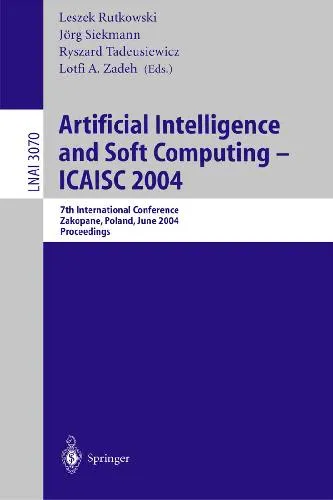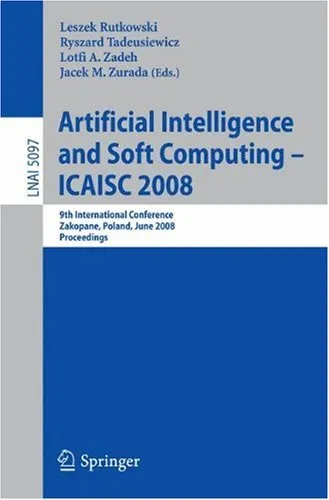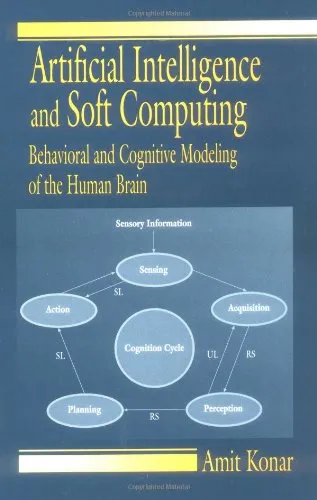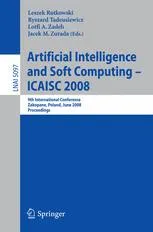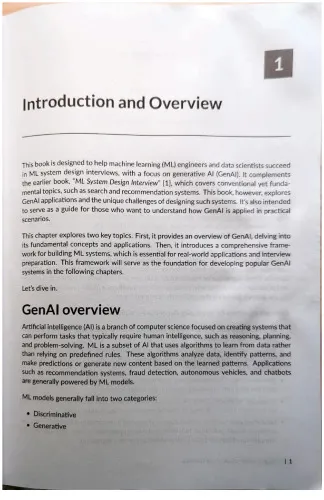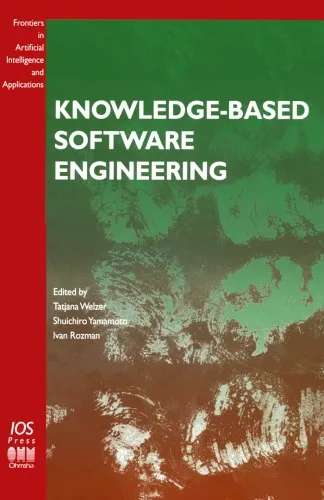Artificial Intelligence and Soft Computing -- Icaisc 2004
3.8
بر اساس نظر کاربران

شما میتونید سوالاتتون در باره کتاب رو از هوش مصنوعیش بعد از ورود بپرسید
هر دانلود یا پرسش از هوش مصنوعی 2 امتیاز لازم دارد، برای بدست آوردن امتیاز رایگان، به صفحه ی راهنمای امتیازات سر بزنید و یک سری کار ارزشمند انجام بدینکتاب های مرتبط:
مقدمه کتاب "Artificial Intelligence and Soft Computing -- ICAISC 2004"
کتاب Artificial Intelligence and Soft Computing -- ICAISC 2004 مجموعهای ویژه از مقالات پژوهشی پیشرفته در زمینه هوش مصنوعی و محاسبات نرم است. این کتاب که به ویراستاری مشترک پروفسور L. Rutkowski و L.A. Zadeh منتشر شده، بستری برای ارائه جدیدترین دستاوردها و یافتههای علمی در حوزههایی همچون شبکههای عصبی، Fuzzy Logic، الگوریتمهای یادگیری و سیستمهای هوشمند فراهم کرده است. در این اثر، کاربردهای عملی هوش مصنوعی و محاسبات نرم در مسائلی نظیر تحلیل دادهها، بهینهسازی و تصمیمگیری بررسی شده است.
این کنفرانس که در سال 2004 برگزار شد، یکی از رویدادهای شاخص علمی برای تبادل ایدهها، توسعه نظریهها، و گفتگو میان محققین برجسته در این حوزهها بوده و اکنون یافتهها و نتایج آن در این کتاب گردآوری شده است. هدف این کتاب، فراهم آوردن دیدگاهی گستردهتر نسبت به روشهای پیشرفته هوش مصنوعی و پیوند آنها با رویکردهای محاسبات نرم است.
خلاصهای جامع از کتاب
این کتاب شامل چندین مقاله و پژوهش است که به سه حوزه اصلی میپردازد:
- شبکههای عصبی: بررسی معماریها، الگوریتمهای یادگیری و کاربردهای شبکههای عصبی در حل مسائل پیچیده.
- Fuzzy Logic: بحث در مورد منطق فازی و چگونگی استفاده از آن در سیستمهای تصمیمگیری با دادههای غیرقطعی.
- الگوریتمهای تکاملی: روشهایی مانند Genetic Algorithm که برای بهینهسازی و جستجوی فضای مسئله استفاده میشوند.
هر مقاله به صورت جداگانه چالشها و سپس راهحلهایی نوین برای مشکلات خاصی ارائه میدهد. این کتاب بهصورتی طراحی شده که چه برای محققان تازهکار و چه برای متخصصان باتجربه در حوزههای هوش مصنوعی و محاسبات نرم مفید باشد.
نکات کلیدی
کتاب Artificial Intelligence and Soft Computing -- ICAISC 2004 شامل نکات و دستاوردهای کلیدی زیر است:
- معرفی ترکیبی از روشهای سنتی و نوآورانه در محاسبات نرم مانند Hybrid Systems.
- تشریح کاربردهای عملی هوش مصنوعی، از جمله شناسایی الگو، پیشبینی و تحلیل دادهها.
- پرداختن به روشهای چابک و تسریع محاسبات پیشرفته در سیستمهای یادگیری.
- تحلیل چالشهای پیشروی تحقیق در زمینه Intelligence Agents و راهکارهایی برای پیشرفت آنها.
این نکات راهنمایی ارزشمند برای توسعهدهندگان، پژوهشگران و دانشجویان در حوزههای مرتبط خواهد بود.
نقلقولهای مشهور از کتاب
"Soft Computing methodologies are designed to model real-life systems where classical methods fail due to uncertainty and complexity."
"Artificial Intelligence, coupled with Soft Computing, opens the door to a new era of adaptive and flexible systems."
چرا این کتاب مهم است؟
کتاب Artificial Intelligence and Soft Computing -- ICAISC 2004 نه تنها منبعی جامع در مورد مفاهیم نظری و الگوریتمهای هوش مصنوعی و محاسبات نرم است، بلکه نشاندهنده ادغام موفقیتآمیز نظریه و عمل در زمینههای کاربردی نیز میباشد. از آنجایی که موضوعات مطرحشده در کتاب شامل گستره وسیعی از کاربردها، از جمله مهندسی، پزشکی، علوم اجتماعی و اقتصاد میشود، این اثر مرجعی کامل برای محققان و متخصصان این رشتهها به شمار میرود. بهعلاوه، این کتاب بهخوبی اهمیت Fuzzy Logic و محاسبات تکاملی را در حل مشکلات واقعی نشان میدهد.
اگر به دنبال منبعی هستید که هم به مفاهیم بنیادی و هم به کاربردهای عملی در حوزههای نوآورانه مانند Soft Computing بپردازد، این کتاب یک انتخاب فوقالعاده است.
Introduction to 'Artificial Intelligence and Soft Computing -- ICAISC 2004'
The book "Artificial Intelligence and Soft Computing -- ICAISC 2004", edited by Rutkowski L. and Zadeh L. A., is a hallmark contribution to the interdisciplinary fields of Artificial Intelligence (AI) and Soft Computing. Originating from the proceedings of the 7th International Conference on Artificial Intelligence and Soft Computing, this book offers an enriching exploration of AI's cutting-edge techniques and the synergistic relationship between soft computing methodologies, such as fuzzy logic, neural networks, and evolutionary algorithms.
In a rapidly evolving technological era where intelligent systems govern varied aspects of our daily lives, this compilation sheds light on innovative algorithms, practical implementations, and theoretical advancements. It stands as an invaluable reference for researchers, professionals, and students looking to broaden their understanding of AI systems and their linkages to soft computing frameworks.
Detailed Summary of the Book
The book spans an extensive array of topics, each delving into the critical facets of AI and soft computing. It brings together high-quality, peer-reviewed papers showcasing groundbreaking research and case studies, all presented by domain specialists. Key areas covered include machine learning, fuzzy inference systems, optimization techniques, evolutionary computation, decision support systems, and hybrid models combining multiple paradigms.
Specifically, the book explores the following:
- New trends in adaptive and flexible intelligent systems capable of discerning patterns and decisions from intricate data.
- The importance and applications of fuzzy logic in real-world settings such as control systems and data analysis.
- How neural network advancements are boosting areas like image recognition and natural language processing.
- Development of hybrid models that synergize the strengths of distinct computational intelligence techniques.
- Innovative uses of AI in industries such as healthcare, finance, robotics, and more.
By covering theoretical and applied aspects in one cohesive framework, the book fosters a holistic understanding of artificial intelligence and its interconnections with the "soft" approaches of computational intelligence.
Key Takeaways
Readers can expect to gain:
- A clearer understanding of soft computing techniques and how they complement hard computing approaches in solving real-life problems.
- Insights into the fusion of traditional AI methods with fuzzy systems, genetic algorithms, and neural models to create efficient hybrid techniques.
- In-depth discussions on emerging trends in machine learning and adaptive systems.
- Practical knowledge applicable to real-world challenges faced in academic research, business, and engineering industries.
Famous Quotes from the Book
"The hallmark of soft computing is its ability to handle uncertainty and partial truth seamlessly, bridging the gap between human reasoning and machine intelligence." – Rutkowski L.
"Nature’s way of problem-solving, reflected in evolutionary computation, holds the key to unlocking AI’s potential in complex and dynamic environments." – Zadeh L. A.
"The future of artificial intelligence lies in the convergence of disciplines—where fuzzy logic, neurocomputing, and evolutionary strategies blur the boundaries of possibility." – ICAISC 2004 Proceedings
Why This Book Matters
"Artificial Intelligence and Soft Computing -- ICAISC 2004" holds immense significance at both academic and practical levels. It bridges critical knowledge gaps for researchers by offering insights into emerging AI methodologies and their practical implementations. For practitioners, it serves as a resource to harness AI and soft computing for real-world problem-solving tasks.
This book underscores the importance of integration between AI and soft computing to conceptualize and develop effective solutions. It is a testament to the value of exploring diverse approaches for resolving challenges that traditional methods find prohibitively complex. Moreover, with soft computing's ability to handle imprecision and uncertainty, readers gain a fresh perspective on how machines can thrive in a data-rich but unpredictable world.
In an age where AI has penetrated virtually every sector, this book provides the foundational and advanced knowledge that readers need to stay ahead. By synthesizing theoretical advancements with applied research, it empowers engineers, developers, business leaders, and academicians to conceptualize forward-thinking, AI-driven solutions.
دانلود رایگان مستقیم
شما میتونید سوالاتتون در باره کتاب رو از هوش مصنوعیش بعد از ورود بپرسید
دسترسی به کتابها از طریق پلتفرمهای قانونی و کتابخانههای عمومی نه تنها از حقوق نویسندگان و ناشران حمایت میکند، بلکه به پایداری فرهنگ کتابخوانی نیز کمک میرساند. پیش از دانلود، لحظهای به بررسی این گزینهها فکر کنید.
این کتاب رو در پلتفرم های دیگه ببینید
WorldCat به شما کمک میکنه تا کتاب ها رو در کتابخانه های سراسر دنیا پیدا کنید
امتیازها، نظرات تخصصی و صحبت ها درباره کتاب را در Goodreads ببینید
کتابهای کمیاب یا دست دوم را در AbeBooks پیدا کنید و بخرید
1136
بازدید3.8
امتیاز0
نظر98%
رضایتنظرات:
3.8
بر اساس 0 نظر کاربران
Questions & Answers
Ask questions about this book or help others by answering
No questions yet. Be the first to ask!
